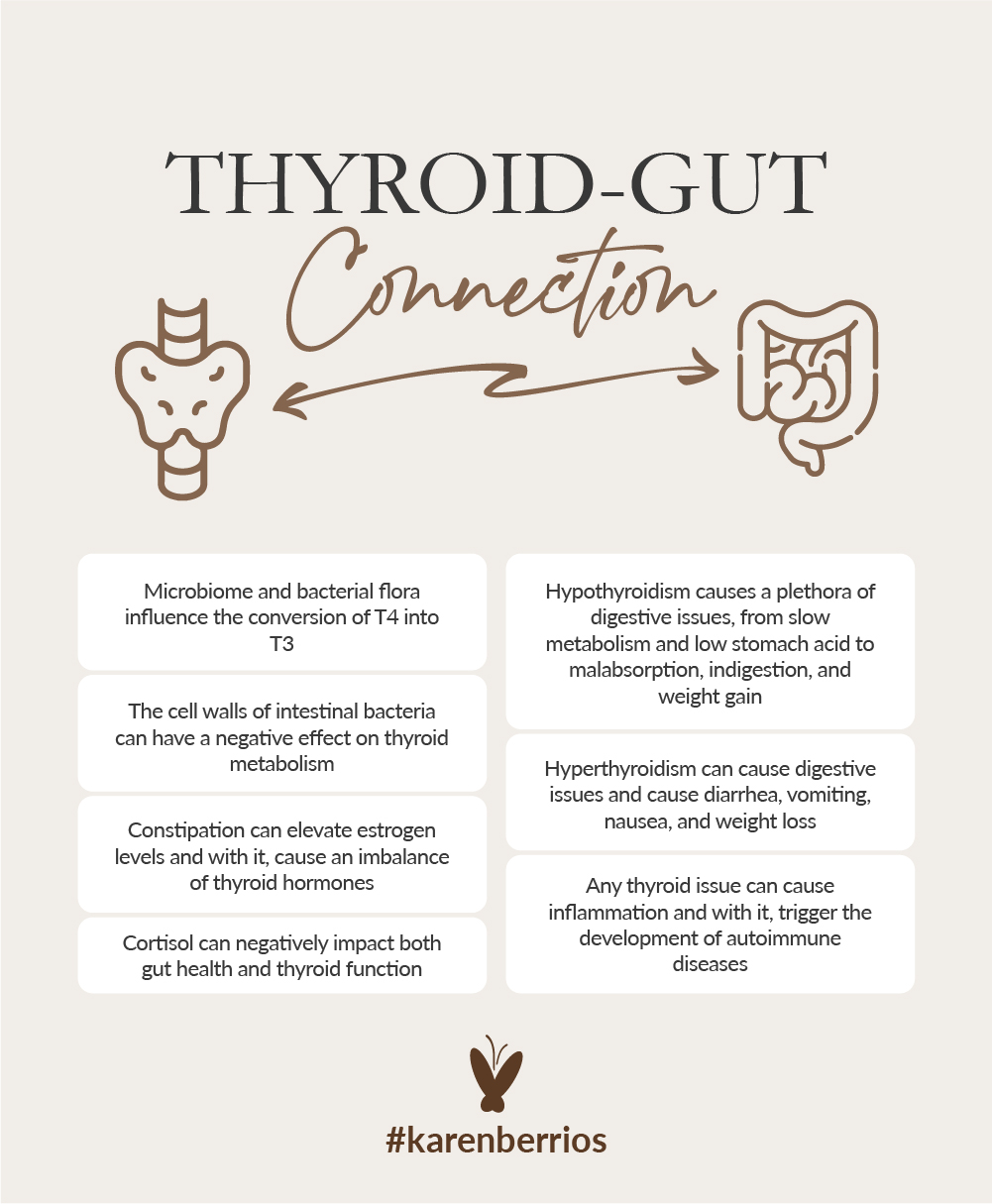

Thyroid Gut Connection
Thyroid Gut Connection. Our bodies consist of amazing systems working together. Imbalances in one area can cause problems in others. That’s the case with the thyroid-gut connection.
Two very important hormone-controlled areas of the body, the thyroid and the gut influence the rest of the body systems, either optimizing them or impairing their function.
Microbiome Thyroid Gut Connection
Gut health is represented by a functioning digestive tract, efficient nutrient absorption, and a balanced microbiome. Poor gut health leads to chronic pain, fatigue, bloating, diarrhea, constipation, nausea, food intolerances, and increased disease risks.
Thyroid hormones play a key role in basal metabolism, defining how well we digest, assimilate, and absorb our food and nutrients, particularly in the intestine and internal organs. Research shows how gut bacteria assist in converting inactive thyroxine (T4) into the active form of thyroid hormone, triiodothyronine (T3) by using an enzyme called intestinal sulfatase.
When there’s an imbalance in your microbiome, this enzyme’s production is significantly reduced. Consequently reducing the conversion of the thyroid hormones, potentially causing symptoms of thyroid disorders. This shows how your thyroid and digestive problems cannot only coincide, but actually influence one another.
Another important discovery showcases how the cell walls of intestinal bacteria, also known as lipopolysaccharides (LPS), can have a negative effect on thyroid metabolism by reducing thyroid hormone levels, blocking thyroid hormone receptor sites, increasing the amounts of inactive T3, decreasing TSH, and even promoting autoimmune thyroid disease (AITD).
An interesting note on constipation: It can impair hormone clearance and cause high levels of estrogen, which in turn raises thyroid-binding globulin (TBG) levels and decreases the levels of free thyroid hormones available to the body. On the other hand, low thyroid function slows digestion time, causing constipation, increasing inflammation, malabsorption, and a higher risk of infections.
The Role of Cortisol
Another important factor in reducing the conversion into T3 is a high level of cortisol. Cortisol is the so-called stress hormone that spikes up whenever a stressful situation occurs. It’s a natural body response also known as fight-or-flight, that helps the body focus and fight for survival.
But that’s not the type of cortisol spike we should be worried about. When your cortisol levels elevate without a present threat, that’s when things start to get out of balance. Inflammation, and especially chronic inflammation, triggers chronic cortisol spikes, impairing the function of your digestive system as well as your thyroid. Cortisol inhibits the secretion of TSH (thyroid-stimulating hormone) from the pituitary gland, which leads to partial suppression of T4, the main hormone produced by the thyroid gland.
And when you already have a thyroid condition like hypothyroidism or hyperthyroidism, you’re more sensitive to mental and physical stress. The excessively high or low levels of thyroid hormones affect how the whole body reacts to stress, not just the thyroid gland.
Thyroid and Stomach Issues
Studies show a strong connection between atrophic body gastritis, a condition related to low stomach acid or hypochlorhydria, and autoimmune thyroid disease. Low stomach acid can cause inflammation and with it, a myriad of other digestive issues. When there’s not enough acidity, your body’s ability to break down food decreases.
This means the food sits in the stomach for a longer time than it should, causing bacteria buildup. This creates a strong inflammatory response by the immune system, wreaking havoc throughout the entire body, affecting all systems, and with it thyroid function as well.
On the other hand, hypothyroidism causes low stomach acid, slowing your metabolism, impairing your ability to absorb nutrients, and increasing inflammation.
Hypothyroidism and Digestive Issues
Hypothyroidism is a thyroid condition where the thyroid gland doesn’t produce and release enough thyroid hormones into the bloodstream. This, in turn, makes your metabolism slow down, causing digestive issues, low stomach acid, poor nutrient absorption, potential weight gain, and inflammation in the digestive tract. This just proves how the thyroid gland and thyroid disorders can have a significant impact on the gastrointestinal system.
The most common case of hypothyroidism is Hashimoto’s disease, an autoimmune condition that causes the body’s immune system to attack and damage the thyroid. This inhibits the hormone production of the thyroid gland, causing hypothyroidism. Since this is an autoimmune disease, it differs from person to person, but almost everyone notices the same symptoms first:
- Fatigue
- Low body temperature
- Digestive issues and inexplicable weight gain
Hashimoto’s disease and hypothyroidism cause inflammation in the entire body. Increasing the risk of developing many diseases that can attack the digestive system, like irritable bowel syndrome or IBS. Even trigger some other autoimmune diseases like celiac disease that damages the small intestine.
Hyperthyroidism and Digestive Issues
On the other hand, having an overactive thyroid means there’s an excess of T4 hormones in your bloodstream. Accelerating your body’s metabolism and leading to unintentional weight loss and a rapid or irregular heartbeat. You may also experience diarrhea, nausea, vomiting, lactose intolerance, and even Helicobacter pylori bacterial infection.
Even though having low levels of thyroid hormones is a more severe condition than having them elevated, neither one is good. Maintaining balance is the goal.
Thyroid, Gut, and The Immune System
The gut hosts 70% of the immune tissue in the body, collectively referred to as gut-associated lymphoid tissue or GALT. It consists of lymphoid tissues that store immune cells and help the body fight against disease, bacteria, and viruses. When your gut health is compromised and the intestinal barrier becomes permeable (also known as leaky gut). Molecules can get from the gut into the bloodstream, causing a strong inflammatory response by your immune system. This powerful response can trigger autoimmune conditions like celiac disease or Hashimoto’s disease.
On the other hand, thyroid hormones strongly affect the tight junctions in the stomach and small intestine. Two cells connect these areas, forming the impermeable gut barrier, and T3 and T4 shield the gut mucosal lining, preventing stress-induced ulcer formation.
Final Thoughts about Thyroid Gut Connection
The thyroid-gut connection is strong and when there’s an imbalance in one, the other always follows. That’s why taking care of your gut health helps keep your thyroid healthy.
When you’re dealing with a thyroid condition, turn your focus to food and nutrition. Clean up your diet, get rid of ultra-processed products, include more plant-based foods and decrease animal products. Educate yourself on the sourcing of your ingredients with disease-fighting superfoods like the Peruvian cacao, ginger, maca, and more.

hey there
I'm Karen!
I have found my cancer journey to be a positive and profound transformational experience. I’m inspired to share my healing journey here, and trust you’ll find hope, encouragement and purpose as you discover the healing power that lies within you.
Join
The Mailing List!
By signing up for my newsletter, you agree with our Privacy Policy and Terms & Conditions.



